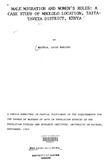| dc.description.abstract | A remarkable feature of development process is the process of migration. While this phenomenon might be regarded as inevitable and desirable result of industriali~ation especially rural-urban migration, policy makers in developing countries have tended to view it with considerable anxiety as in recent years, the process has worsened the problem of urban intra and rural development.
The magnitude of these problems has forced policy makers in many African countries, including Kenya to introduce measures to check the flow, especially of rural-urban migration. In their efforts to grapple with these problems, policy makers need not only quantitative but also qualitative information on the important variables affecting rural-urban migration as well as data on the consequences of such migration on agricultural sector and on the rest of the economy. Consequences in the urban areas of destination are well documented, but rural areas of migrants' origin are still plagued with a dearth of information on the consequences of such processes on the population left behind (Mochoge, 1981).
The thrust of this study is to examine the consequences of
male household heads rural out-migration on the population left behind, more specifically, the women, with particular reference to their socio-economic roles. The study's main objective is to establish whether male out-migration affects women's socio-economic roles in areas of out-migration. ±he socio-economic roles examined include workload aspects, decision making structures and the utilization of migrants' remittances in relation to the women's
socio-economic roles.
The study used....-primary data, collected in Mbololo Location,
Taita Taveta District, Kenya. The main methods of analysis included | en |

